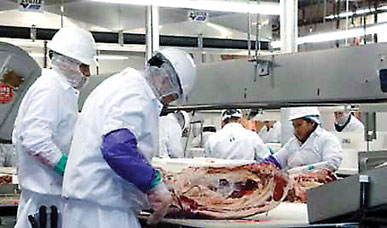Nebraska Satisfies Food Processors R&D and Power Needs
Food processors in Nebraska can get help from the states educational/research institutions, as well as benefit from incentives provided by the state’s largest electric utility, NPPD.
2016 Food Processing

Nebraska provides many advantages to food processors of all sizes, including its central geographic location with access to I-80, the most traveled east-west interstate highway; a high-quality, productive workforce with low turnover and absenteeism rates; and reliable supplies of affordable energy that are particularly important to the food processing industry. Nebraska’s electric rates for typical industrial customers are 21 percent lower than the U.S. average and are among the lowest in the lower 48 states.
Nebraska is the only state in the nation with electric service provided entirely by public power. The Nebraska Public Power District (NPPD) is the state’s largest electric utility, serving 86 of the state’s 93 counties with a diverse mix of fuels. Together with its public power partners, NPPD has developed a large customer economic development incentive electric rate that offers energy at a discounted price for a fixed period of time.
Other incentives are offered for energy-efficiency programs. For example, Open Range Beef’s meat processing plant in Gordon recently received an incentive from NPPD to improve the efficiency of the compressed air system used in its operations, thereby reducing electricity use.
Project Announcements
Germany-Based KettenWulf Plans Auburn, Alabama, Production Operations
01/28/2026
Frontieras North America Plans Mason County, West Virginia, Operations
01/28/2026
North Wind Plans Rosemount, Minnesota, Research Operations
01/27/2026
DSV Global Transport and Logistics Plans Mesa, Arizona, Headquarters Operations
01/24/2026
Poland-Based JGB Brothers Plans Bamberg County, South Carolina, Production Operations
01/23/2026
Electric Research and Manufacturing Cooperative Plans Waddell, Arizona, Transformer Production Operations
01/23/2026
Most Read
-
The Workforce Bottleneck in America’s Manufacturing Revival
Q4 2025
-
Data Centers in 2025: When Power Became the Gatekeeper
Q4 2025
-
Speed Built In—The Real Differentiator for 2026 Site Selection Projects
Q1 2026
-
Preparing for the Next USMCA Shake-Up
Q4 2025
-
Tariff Shockwaves Hit the Industrial Sector
Q4 2025
-
Top States for Doing Business in 2024: A Continued Legacy of Excellence
Q3 2024
-
Investors Seek Shelter in Food-Focused Real Estate
Q3 2025